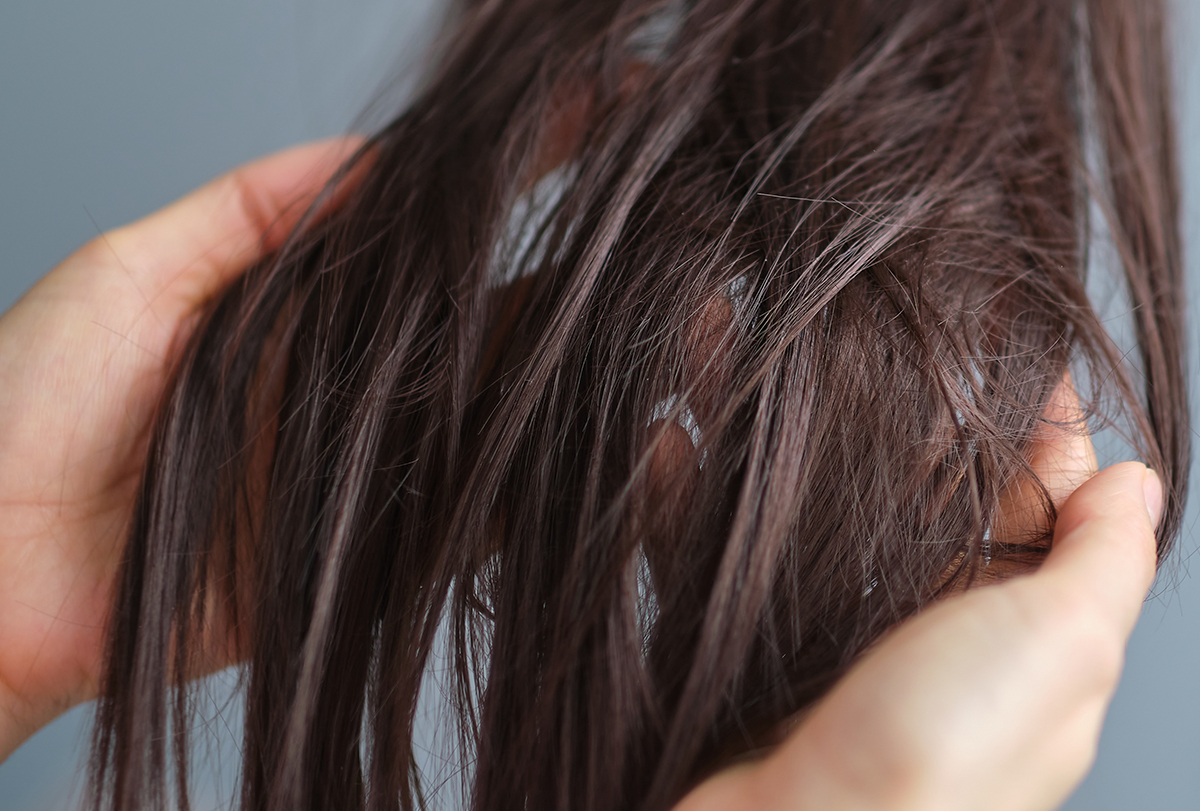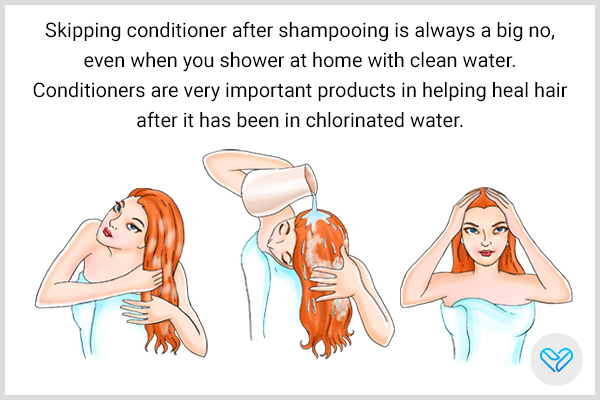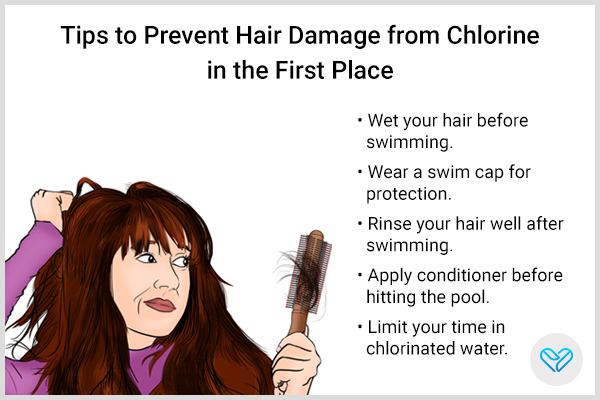In this article:
Going for a quick spin or a dive into the pool is something many people love to do. The idea of being surrounded by water as you float on the gentle waves is just so relaxing.

However, as much as this exciting activity is on everyone’s to-do lists, it is important to take a step back and look into its negative effects. You must be wondering, what harm can swimming in a pool cause?
Well, it is not the swimming or the pool or the water that causes harm but the chlorine that is added to the pool for cleaning of the water.
And to what does it cause harm? The answer is simple – your hair! Chlorinated water can be bad for your hair health.
The hair has an outer layer (cuticle) protecting the inner layer (cortex), and a natural lubricant (sebum) shields the cuticle. However, chlorine removes sebum, making the cuticle vulnerable. This can lead to dryness and split ends in your hair.
Research has shown that chlorine, especially when combined with sunlight, can damage both hair color and hair proteins. A study showed that hair samples can dissolve in just 4 hours under these conditions.
Thus, swimming in chlorinated pools under the sun can be harsh on your hair. (1)
So, what’s the solution? How can you fix chlorine-damaged hair? Read on to find out.
Guide to Fixing Chlorine-Damaged Hair
Here’s what you can do to manage hair damage caused by exposure to pool chlorine.
1. Use clarifying shampoos
After a dip in a chlorinated pool, your hair asks for a deep-cleansing session. But do not worry, this doesn’t mean you have to book a salon appointment every time you swim. You can simply use clarifying shampoos to deeply clean your strands.
Clarifying shampoos are different from regular ones. They’re made to thoroughly cleanse your hair by removing product buildup.
Everyday shampoos can’t do this effectively, leaving a residue that makes your hair rough and dull. (2)(3)
2. Do not skip the conditioner

Skipping conditioner after shampooing is always a big no, even when you shower at home with clean water. Conditioners are very important products in helping heal hair after it has been in chlorinated water.
Conditioners shield your hair from damage caused by chlorine. They work by smoothing the hair’s surface and locking in essential moisture, ensuring your locks stay smooth (4) and healthy after swimming in chlorinated water.
3. Use a scalp treatment
Balancing your scalp’s oil production is essential for repairing chlorine-damaged hair. Too much or too little oil can worsen the effects of chlorine damage, leading to problems such as hair fall and dandruff.
Research indicates that scalp treatments such as rosemary oil can effectively address these issues. (5)
4. Get a protein treatment
Protein treatments are like a rescue mission for chlorine-damaged hair. They restore the lost proteins, making your hair strong and healthy.
These treatments work by infusing proteins into your hair, repairing damage, and improving its shine, softness, and manageability.
They can also help mend the damage caused by chemicals, thanks to the peptides and amino acids they contain. (6)
5. Massage hair with coconut oil
Coconut oil, a common household item, can work wonders for chlorine-damaged hair. This natural oil, derived from coconuts, is well known in countries such as India and Sri Lanka.
Packed with various fatty acids and antioxidants, coconut oil offers several benefits for your hair. It can be mixed with shampoos for added cleansing power and serves as an effective antibacterial and antifungal agent to keep your scalp healthy.
One of its remarkable qualities is its ability to penetrate the hair shaft and help prevent protein loss, making it an ideal remedy for chlorine-damaged hair. (7)
How to Prevent Hair Damage from Chlorine in the First Place?

Experts recommend the following measures to make sure you do not experience a lot of hair damage from being in chlorinated water:
- Wet your hair before swimming.
- Wear a swim cap for protection.
- Rinse your hair well after swimming.
- Apply conditioner before hitting the pool.
- Limit your time in chlorinated water.
- Use protective hairstyles such as braids and buns.
- Wear a sun hat for UV protection.
- Stick to a regular hair care routine.
- Trim your hair regularly to remove damage.
- Stay hydrated to help your hair stay healthy.
Most-Asked Questions
When does chlorine damage show up?
Damage can become noticeable after a few pool sessions, but it varies with hair type and care.
Does hair type matter?
Hair type matters, as some types such as thin hair and colored hair, are more susceptible to chlorine damage.
How does chlorine damage hair?
Chlorine makes hair dry and brittle and can fade hair color by stripping the hair’s natural oils and proteins.
Final Word
Swimming in chlorinated pools can damage your hair, causing dryness and split ends.
To fix this damage, use clarifying shampoos, always condition, balance scalp oils, apply protein treatments, and use coconut oil.
For prevention, wet your hair, use swim caps, rinse and condition, limit exposure to chlorine, maintain hair care routines, trim regularly, and stay hydrated.
- Was this article helpful?
- YES, THANKS!NOT REALLY


